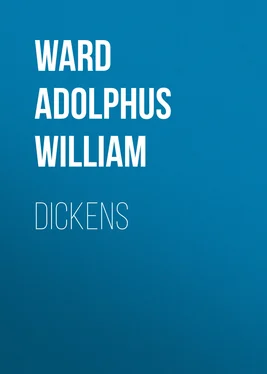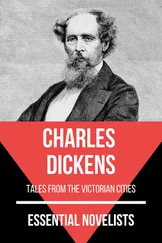Adolphus Ward - Dickens
Здесь есть возможность читать онлайн «Adolphus Ward - Dickens» — ознакомительный отрывок электронной книги совершенно бесплатно, а после прочтения отрывка купить полную версию. В некоторых случаях можно слушать аудио, скачать через торрент в формате fb2 и присутствует краткое содержание. Жанр: Биографии и Мемуары, foreign_antique, на английском языке. Описание произведения, (предисловие) а так же отзывы посетителей доступны на портале библиотеки ЛибКат.
- Название:Dickens
- Автор:
- Жанр:
- Год:неизвестен
- ISBN:нет данных
- Рейтинг книги:5 / 5. Голосов: 1
-
Избранное:Добавить в избранное
- Отзывы:
-
Ваша оценка:
- 100
- 1
- 2
- 3
- 4
- 5
Dickens: краткое содержание, описание и аннотация
Предлагаем к чтению аннотацию, описание, краткое содержание или предисловие (зависит от того, что написал сам автор книги «Dickens»). Если вы не нашли необходимую информацию о книге — напишите в комментариях, мы постараемся отыскать её.
Dickens — читать онлайн ознакомительный отрывок
Ниже представлен текст книги, разбитый по страницам. Система сохранения места последней прочитанной страницы, позволяет с удобством читать онлайн бесплатно книгу «Dickens», без необходимости каждый раз заново искать на чём Вы остановились. Поставьте закладку, и сможете в любой момент перейти на страницу, на которой закончили чтение.
Интервал:
Закладка:
Sir Adolphus William Ward
Dickens
PREFACE
At the close of a letter addressed by Dickens to his friend John Forster, but not to be found in the English editions of the Life , the writer adds to his praises of the biography of Goldsmith these memorable words: “I desire no better for my fame, when my personal dustiness shall be past the control of my love of order, than such a biographer and such a critic.” Dickens was a man of few close friendships—“his breast,” he said, “would not hold many people”—but, of these friendships, that with Forster was one of the earliest, as it was one of the most enduring. To Dickens, at least, his future biographer must have been the embodiment of two qualities rarely combined in equal measure—discretion and candour. In literary matters his advice was taken almost as often as it was given, and nearly every proof-sheet of nearly every work of Dickens passed through his faithful helpmate’s hands. Nor were there many important decisions formed by Dickens concerning himself in the course of his manhood to which Forster was a stranger, though, unhappily, he more than once counselled in vain.
On Mr. Forster’s Life of Charles Dickens , together with the three volumes of Letters collected by Dickens’s eldest daughter and his sister-in-law—his “dearest and best friend”—it is superfluous to state that the biographical portion of the following essay is mainly based. It may be superfluous, but it cannot be considered impertinent, if I add that the shortcomings of the Life have, in my opinion, been more frequently proclaimed than defined; and that its merits are those of its author as well as of its subject.
My sincere thanks are due for various favours shown to me in connexion with the production of this little volume by Miss Hogarth, Mr. Charles Dickens, Professor Henry Morley, Mr. Alexander Ireland, Mr. John Evans, Mr. Robinson, and Mr. Britton. Mr. Evans has kindly enabled me to correct some inaccuracies in Mr. Forster’s account of Dickens’s early Chatham days on unimpeachable first-hand evidence. I also beg Captain and Mrs. Budden to accept my thanks for allowing me to see Gad’s Hill Place.
I am under special obligations to Mr. R. F. Sketchley, Librarian of the Dyce and Forster Libraries at South Kensington, for his courtesy in affording me much useful aid and information. With the kind permission of Mrs. Forster, Mr. Sketchley enabled me to supplement the records of Dickens’s life, in the period 1838-’41, from a hitherto unpublished source—a series of brief entries by him in four volumes of The Law and Commercial Daily Remembrancer for those years. These volumes formed no part of the Forster bequest, but were added to it, under certain conditions, by Mrs. Forster. The entries are mostly very brief; and sometimes there are months without an entry. Many days succeed one another with no other note than “Work.”
Mr. R. H. Shepherd’s Bibliography of Dickens has been of considerable service to me. May I take this opportunity of commending to my readers, as a charming reminiscence of the connexion between Charles Dickens and Rochester , Mr. Robert Langton’s sketches illustrating a paper recently printed under that title?
Last, not least, as the Germans say, I wish to thank my friend Professor T. N. Toller for the friendly counsel which has not been wanting to me on this, any more than on former occasions.
A. W. W.CHAPTER I
Charles Dickens, the eldest son, and the second of the eight children, of John and Elizabeth Dickens, was born at Landport, a suburb of Portsea, on Friday, February 7, 1812. His baptismal names were Charles John Huffham. His father, at that time a clerk in the Navy Pay Office, and employed in the Portsmouth Dock-yard, was recalled to London when his eldest son was only two years of age; and two years afterwards was transferred to Chatham, where he resided with his family from 1816 to 1821. Thus Chatham, and the more venerable city of Rochester adjoining, with their neighbourhood of chalk hills and deep green lanes and woodland and marshes, became, in the words of Dickens’s biographer, the birthplace of his fancy. He looked upon himself as, to all intents and purposes, a Kentish man born and bred, and his heart was always in this particular corner of the incomparable county. Again and again, after Mr. Alfred Jingle’s spasmodic eloquence had, in the very first number of Pickwick , epitomised the antiquities and comforts of Rochester, already the scene of one of the Sketches , Dickens returned to the local associations of his early childhood. It was at Chatham that poor little David Copperfield, on his solitary tramp to Dover, slept his Sunday night’s sleep “near a cannon, happy in the society of the sentry’s footsteps;” and in many a Christmas narrative or uncommercial etching the familiar features of town and country, of road and river, were reproduced, before in Great Expectations they suggested some of the most picturesque effects of his later art, and before in his last unfinished romance his faithful fancy once more haunted the well-known precincts. During the last thirteen years of his life he was again an inhabitant of the loved neighbourhood where, with the companions of his mirthful idleness, he had so often made holiday; where, when hope was young, he had spent his honey-moon; and whither, after his last restless wanderings, he was to return, to seek such repose as he would allow himself, and to die. But, of course, the daily life of the “very queer small boy” of that early time is only quite incidentally to be associated with the grand gentleman’s house on Gad’s Hill, where his father, little thinking that his son was to act over again the story of Warren Hastings and Daylesford, had told him he might some day come to live, if he were to be very persevering, and to work hard. The family abode was in Ordnance (not St. Mary’s) Place, at Chatham, amidst surroundings classified in Mr. Pickwick’s notes as “appearing to be soldiers, sailors, Jews, chalk, shrimps, offices, and dock-yard men.” But though the half-mean, half-picturesque aspect of the Chatham streets may already at an early age have had its fascination for Dickens, yet his childish fancy was fed as fully as were his powers of observation. Having learned reading from his mother, he was sent with his elder sister, Fanny, to a day-school kept in Gibraltar Place, New Road, by Mr. William Giles, the eldest son and namesake of a worthy Baptist minister, whose family had formed an intimate acquaintance with their neighbours in Ordnance Row. The younger Giles children were pupils at the school of their elder brother with Charles and Fanny Dickens, and thus naturally their constant playmates. In later life Dickens preserved a grateful remembrance, at times refreshed by pleasant communications between the families, of the training he had received from Mr. William Giles, an intelligent as well as generous man, who, recognising his pupil’s abilities, seems to have resolved that they should not lie fallow for want of early cultivation. Nor does there appear to be the slightest reason for supposing that this period of his life was anything but happy. For his sister Fanny he always preserved a tender regard; and a touching little paper, written by him after her death in womanhood, relates how the two children used to watch the stars together, and make friends with one in particular, as belonging to themselves. But obviously he did not lack playmates of his own sex; and it was no doubt chiefly because his tastes made him disinclined to take much part in the rougher sports of his school-fellows, that he found plenty of time for amusing himself in his own way. And thus it came to pass that already as a child he followed his own likings in the two directions from which they were never very materially to swerve. He once said of himself that he had been “a writer when a mere baby, an actor always.”
Читать дальшеИнтервал:
Закладка:
Похожие книги на «Dickens»
Представляем Вашему вниманию похожие книги на «Dickens» списком для выбора. Мы отобрали схожую по названию и смыслу литературу в надежде предоставить читателям больше вариантов отыскать новые, интересные, ещё непрочитанные произведения.
Обсуждение, отзывы о книге «Dickens» и просто собственные мнения читателей. Оставьте ваши комментарии, напишите, что Вы думаете о произведении, его смысле или главных героях. Укажите что конкретно понравилось, а что нет, и почему Вы так считаете.












